|
|
|
Sort Order |
|
|
|
Items / Page
|
|
|
|
|
|
|
| Srl | Item |
| 1 |
ID:
172395
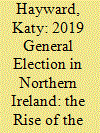

|
|
|
|
|
| Summary/Abstract |
The experience of the 2019 general election in Northern Ireland took a very different course to that of the rest of the UK and, indeed, to the pattern of electoral politics typical of the region. Coming after almost three years with no functioning devolved government, combined with intense disagreement and uncertainty about Brexit, voters were ready to give a message to the two largest parties. Both Sinn Féin and the DUP suffered losses in the election, with the headline outcome being that unionism no longer holds the majority of seats for Northern Ireland in Westminster. More generally, there was a swing from both sides towards centre ground voting, which brought significant gains for the Alliance Party and the SDLP. This article summarises the reasons for this broad trend, focussing on the conditions and electoral pacts which brought it about. It also considers what it might mean for the prospects for Irish unification, noting that a referendum on unification will only be passed by attracting votes from those who tend to see themselves as neither unionist or nationalist.
|
|
|
|
|
|
|
|
|
|
|
|
|
|
|
|
| 2 |
ID:
172398


|
|
|
|
|
| Summary/Abstract |
As the Labour Party ponders who its next leader should be, dealing with anti‐semitism within its ranks has become a touchstone issue. Ivor Gaber, who has watched anti‐semitism within Labour fester long before it hit the headlines, takes a personal view of its roots and consequences and recommends a possible way forward.
|
|
|
|
|
|
|
|
|
|
|
|
|
|
|
|
| 3 |
ID:
172419
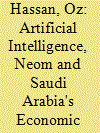

|
|
|
|
|
| Summary/Abstract |
Saudi Arabia is diversifying its economy by becoming a global technological hub. Driven by its ‘Vision 2030' initiative, it has embarked on the most ambitious and far‐reaching transformation plan in the Kingdom's history. At the core of this transformation are the investment and development of artificial intelligence (AI) and its integration into a new mega‐city, Neom. Currently under construction, Neom is seeking to integrate robotics and AI seamlessly into every aspect of citizens' lives in a bid to generate revenues from key economic sectors for the future. This transition from an economy based on hydrocarbons to AI is, however, more than economic. It is a bid to secure the survival of the House of Saud and meet the growing challenges of constructing a state around oil. Nevertheless, what happens in Neom may provide insights into how AI will impact the world beyond a cross‐roads built on sand.
|
|
|
|
|
|
|
|
|
|
|
|
|
|
|
|
| 4 |
ID:
172407
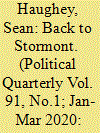

|
|
|
|
|
| Summary/Abstract |
The decision of the Democratic Unionist Party and Sinn Féin to once again share power in Northern Ireland has ended a three‐year hiatus in the region’s devolved government. The deal which resurrects the devolved institutions—New Decade, New Approach—is not short of ambition. It introduces significant institutional reforms which place the institutions on a more sustainable footing and limit the potential for abuse of the Assembly’s infamous Petition of Concern. Nettles have been grasped on issues to do with language, culture, and identity that have long vexed political parties in Northern Ireland. Tucked away in the deal’s appendices are commitments to implement outstanding pledges made in previous agreements, plus ambitious plans for the new Northern Ireland Executive. However, as parties in the region were quick to discover, aspects of this deal are easier said than done. This article considers what New Decade, New Approach promises and, if fully implemented, what its implications are for politics and governance in Northern Ireland.
|
|
|
|
|
|
|
|
|
|
|
|
|
|
|
|
| 5 |
ID:
172399
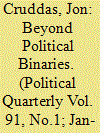

|
|
|
|
|
| Summary/Abstract |
This article considers the results of the 2019 general election with reference to the Dagenham and Rainham constituency in outer East London. It was a key target for the Conservatives with a 70 per cent leave voting electorate. It did not change hands and might therefore provide insights into the wider debate regarding future coalitions and strategy within the modern left. This article considers these results with reference to arguments about a ‘Brexit realignment’ on the left and whether Labour should rethink the nature of its political ‘base’. It argues for a more nuanced debate than that which currently exists, built around simple binaries organised around Brexit, class, age, education and geography.
|
|
|
|
|
|
|
|
|
|
|
|
|
|
|
|
| 6 |
ID:
172404


|
|
|
|
|
| Summary/Abstract |
The decision to leave the EU provoked the biggest constitutional crisis of recent British history. The referendum—a device for circumventing the parliamentary process—was followed by conflict between a minority government and a majority of MPs unwilling to leave the EU without satisfactory alternative arrangements. The courts, drawn into this conflict, upheld conventions that sustain the authority of Parliament and restrain the despotic power of ministers. The reaction of members of the current government was to take disreputable and anti‐democratic positions against both the Speaker of the House of Commons and the courts. They now have a sufficient majority in Parliament to resume adherence to constitutional conventions and restore a political culture of debate and tolerance, but they show little sign of doing so, and there is a risk that they will do irreparable damage to the political culture that underpins democracy.
|
|
|
|
|
|
|
|
|
|
|
|
|
|
|
|
| 7 |
ID:
172406


|
|
|
|
|
| Summary/Abstract |
The Nolan Report will celebrate its twenty‐fifth anniversary in 2020, and for most of this last quarter‐century, it has provided the underlying ethical basis for public life in the United Kingdom. However, its principles are now being called into question in a number of areas, following the Conservative government’s loss of its parliamentary majority in the 2017 election, with the interests of party taking precedence over adherence to both the spirit and the codified practical implementation of some of the ultimate outcomes of Nolan, namely the Ministerial Code and the Commissioner for Parliamentary Standards. This article argues, with explicit evidence and examples, that ministerial conduct which would not have been tolerated before 2017 is now being routinely ignored in the interest of maintaining party unity in order to deliver some form of Brexit. The article concludes by asking whether Nolan norms still command consensus post‐Brexit.
|
|
|
|
|
|
|
|
|
|
|
|
|
|
|
|
| 8 |
ID:
172390
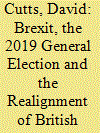

|
|
|
|
|
| Summary/Abstract |
The outcome of the 2019 general election—a resounding Conservative majority and an unprecedented defeat for Labour—delivered a decisive electoral verdict for the first time in recent years following a period where British politics has been characterised by instability and indecision. In this article, we draw on aggregate‐level data to conduct an initial exploration of the vote. What was the impact of Brexit on the 2019 general election result? How far has Brexit reshaped electoral politics? Was 2019 a ‘realignment election’? And, if so, what are the implications? With a focus on England and Wales we show that, although the Conservatives made gains deep into Labour’s working class heartlands, these gains have been a long time coming, reflected in Labour’s weakening relationship with working class Britain. As such, 2019 is not a critical election but a continuation of longer‐term trends of dealignment and realignment in British politics.
|
|
|
|
|
|
|
|
|
|
|
|
|
|
|
|
| 9 |
ID:
172405


|
|
|
|
|
| Summary/Abstract |
In Westminster parliamentary systems there was once a clear separation between the careers of public servants and of elected politicians. Politicians decided what policies they wanted to pursue, while public servants advised, devised and delivered the policies. This separation ensured that policy ideas were developed by a professional elite with experience and knowledge. Politicians came from a variety of backgrounds, entering politics for a variety of reasons. Over time, the source of policy advice for ministers has shifted from the professional public servant to political advisers lacking experience and with different career ambitions than public service. Increasingly, elected politicians are becoming ‘professionalised’—emerging from similar party and adviser backgrounds. The de‐separation of what were once distinct career paths has led to poorer policy development, increasing public malfeasance, a lower‐quality civil service, and democratic disenchantment. We need to separate the career paths once more.
|
|
|
|
|
|
|
|
|
|
|
|
|
|
|
|
| 10 |
ID:
172415


|
|
|
|
|
| Summary/Abstract |
Academic life should be about challenging orthodoxies and assumptions, looking critically at the world. Knowledge production has a value in itself, but it is also about using our enhanced understanding to enable us to change the world for the better. Unfortunately, sometimes the parameters within which knowledge is constructed and analysed can become an obstacle to change. Inertia and at best, incremental change, are all too often features of course design and reading lists.
|
|
|
|
|
|
|
|
|
|
|
|
|
|
|
|
| 11 |
ID:
172417


|
|
|
|
|
| Summary/Abstract |
This article responds to the contemporary debates in UK higher education about the need to ‘decolonise the curriculum’, with particular attention to the implications for the discipline of history. The author positions these important debates as one outcome of a transnational movement led by students of colour whose grievances reach into and beyond the classroom. The first part of the article examines the origins of this movement identifying some important antecedents as well as the broader political and socio‐economic forces that propelled its rise in 2015. There then follows an examination of the movement's multidimensional critique of the university sector, which includes—but is not limited to—the call to ‘decolonise the curriculum', before considering potential implications for academic workers labouring in the discipline of history.
|
|
|
|
|
|
|
|
|
|
|
|
|
|
|
|
| 12 |
ID:
172418
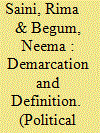

|
|
|
|
|
| Summary/Abstract |
Decolonisation of the curriculum is a burgeoning yet controversial project of radical change, gaining slow but steady traction in higher education politics departments across the country. At its heart is the acknowledgement and systematic unravelling of colonial and imperial practices in the UK university system. This article pins down what decolonisation is and is not, highlighting the barriers and tentative opportunities to effective decolonisation work. This is discussed in the context of the structural constraints that critical scholars of race—particularly those at the intersection of marginalised racial and gender identities—work against in the academy.
|
|
|
|
|
|
|
|
|
|
|
|
|
|
|
|
| 13 |
ID:
172409


|
|
|
|
|
| Summary/Abstract |
Corbynism, to its internal critics, is a ‘hard left’ anachronism. New Labour, to its detractors, was basically Thatcherism. We argue that these meta narratives, critical to internal identity, are flawed. They are pulling the party apart for reasons of political strength and at the expense both of broader interpretation and longer‐term cohesion. Through an analysis of ‘early’ New Labour, we show that how Blair’s project ended is not how it began, and therefore isn’t the whole story. The now half‐forgotten history of New Labour in opposition holds important lessons, including for those trying—for the most part unsuccessfully—to keep the ‘modernising’ flame alive. If the modernisers are to win more converts to their cause they must learn to do what Blair and New Labour did in opposition and not what Blair says today. Drawing on the concept of Labour’s ‘ethos’, we offer five lessons from the party’s past.
|
|
|
|
|
|
|
|
|
|
|
|
|
|
|
|
| 14 |
ID:
172396
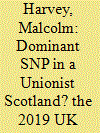

|
|
|
|
|
| Summary/Abstract |
The UK general election in December 2019 produced a resounding victory for Boris Johnson’s Conservatives, returning a majority government and the mandate for Brexit that he had campaigned for. The picture was less rosy for the Conservatives in Scotland, where his party lost half its seats to the SNP. This article reviews the election outcome in Scotland, considering the fortunes of each of the main parties, and projects forward to the devolved election in 2021, when the parties will once again debate the key constitutional question in Scotland.
|
|
|
|
|
|
|
|
|
|
|
|
|
|
|
|
| 15 |
ID:
172391


|
|
|
|
|
| Summary/Abstract |
This article examines the process of extinction of former remainer Conservative MPs who followed different paths in the run‐up to the 2019 general election: either choosing to stay loyal and merge with the rest of the parliamentary party, or to express their discontent and leave the party. When they chose to rebel against the leadership, only a small minority dared to vindicate their position. The other rebels constantly played down their identity as remainers and justified their views in an apologetic way. More remarkably, they were treated differently by Boris Johnson, who eventually suspended the last remainers and called for a general election to renew the composition of the party. The consequences of this last move are crucial in order to understand the radical transformation of the Conservative Party into the actual (and only) ‘party of Brexit’.
|
|
|
|
|
|
|
|
|
|
|
|
|
|
|
|
| 16 |
ID:
172389


|
|
|
|
|
| Summary/Abstract |
What do the different wings of the Labour Party actually disagree about? Sometimes it seems like almost everything, in spite of the warm words about party unity offered by the various leadership contenders in recent weeks. But on closer investigation, the disagreement between left and right is less about policy—on which there is in fact some convergence about the broad direction of travel—and more about entitlement: which faction is the legitimate legatee of the battered, but still attractive, Labour tradition? Since this disagreement is existential—about which side is authentically Labour—it is also a bitter and intractable one.
|
|
|
|
|
|
|
|
|
|
|
|
|
|
|
|
| 17 |
ID:
172416


|
|
|
|
|
| Summary/Abstract |
History has taught us that the Global North's attempts to ‘civilise' the rest of the world's population, both now and in colonial times, have been fraught with difficulty. This paper argues that this difficulty is mainly owing to the political standpoint and positioning of our perceived engineering and technical superiority. A failure to recognise this viewpoint and to change the way in which we work together—in a global sense—to solve issues such as climate change, threatens our ability to survive as a species. Political standpoints on such issues still assume a superiority of governments in the Global North. This paper retraces colonial engineering projects, mainly directed from the UK, that failed to consider the development of other populations in the world, and their needs. It is also posited that our exploitation in the Global North, which assumes historical superiority as a basic premise, will fail in tackling major issues. Change is needed through a decolonisation of engineering projects, and western engineering curricula that are used to train future professionals. Evidence of the impact of decolonisation on the engineering discipline itself is scarce, but nevertheless, a respons
|
|
|
|
|
|
|
|
|
|
|
|
|
|
|
|
| 18 |
ID:
172412


|
|
|
|
|
| Summary/Abstract |
Since 2017 the British Labour Party has proposed mandatory sectoral collective bargaining (SCB) as a comprehensive strategy to rebuild the trade union voice across the entire economy. The intellectual roots lie in the Institute of Employment Rights’ (IER) Manifesto for Labour Law (2016). First, this article explains the core IER approach, questioning its feasibility given current low levels of union membership and bargaining coverage and whether it would produce the stable and productive economy promised. Second, the article develops four social science objections to this state‐driven approach centred on industrial relations history; political sociology; economics; and political philosophy. The conclusion argues that while stronger voluntary trade unions could help, it is neither practicable nor desirable for the state to impose a trade union, single‐channel approach to employee voice. Instead, a ‘mixed economy of voice’ is proposed, perhaps including statutory works councils, which speaks directly to all employees—union and non‐union—and wins broader political, employer and public support.
|
|
|
|
|
|
|
|
|
|
|
|
|
|
|
|
| 19 |
ID:
172392


|
|
|
|
|
| Summary/Abstract |
Anyone who attempts to understand and reverse the major defeat suffered by Labour in the December 2019 general election needs first to appreciate why comparisons with the defeats of the 1980s are so unhelpful. In 1983 Labour was all but wiped out across southern England, but held on comfortably across the ‘red wall’. By contrast, in 2019 Labour did well in cities and university towns across the south, and appears to have solved its historic problem with the southern, educated middle class. However, this has been at the expense of alienating working class voters across the country, not just in its former industrial heartlands. But this is not inevitable. A reanalysis of testimony from hundreds of interviews with working people across England from the 1940s onwards allows insights into attitudes and values that are often obscured by survey techniques. Crucially, it points to a broad‐based vernacular liberalism at odds with the culture wars model of a terminal crisis for social democracy.
|
|
|
|
|
|
|
|
|
|
|
|
|
|
|
|
| 20 |
ID:
172414


|
|
|
|
|
| Summary/Abstract |
Referendums are regularly criticised for reducing complex policy decisions to two maximally opposed options. This reduces opportunities for voter expression and can polarise debates. Alternative referendum designs which present more than two ballot options can offer innovative opportunities, but also raise new challenges. We can benefit by learning from previous experiences with multi‐option referendum voting. Discussions of such experiences are rare and have often focussed on a limited number of cases. This article provides an overview of over 100 multi‐option referendum experiences around the world. It discusses the topics on which they were held and the ballot options that were offered. It then analyses the variety in ballot design in terms of questions posed and voting methods applied. Drawing on the experiences of multi‐option referendums, the article concludes with lessons that can be learned in relation to initiating and designing these referendums.
|
|
|
|
|
|
|
|
|
|
|
|
|
|
|
|
|
|
|
|
|